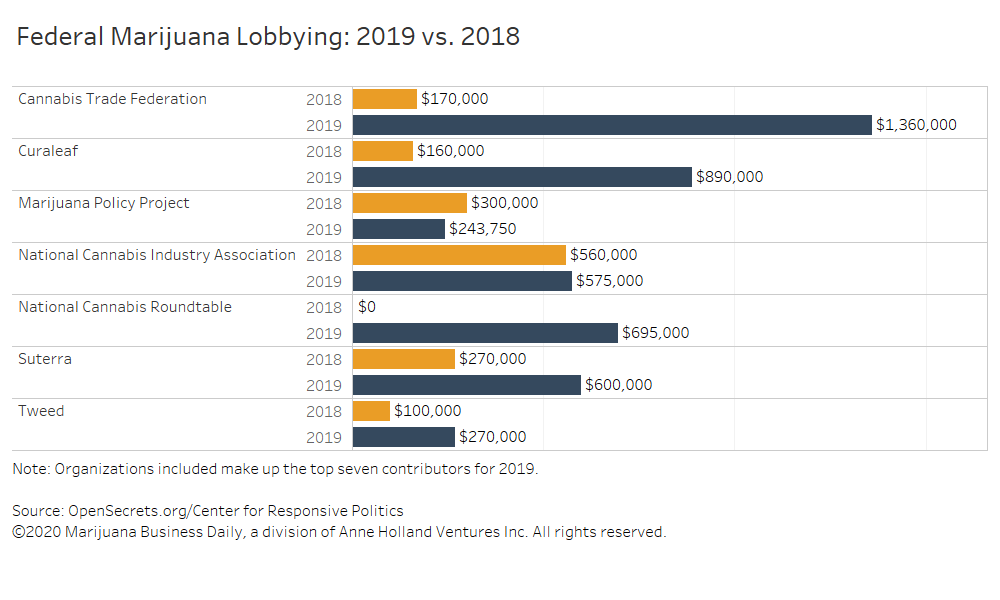The U.S. House of Representatives approved legislation allowing banks to serve cannabis companies by wrapping the measure into a $3 trillion coronavirus economic relief package.
The massive economic stimulus bill, proposed by House Democrats, includes language from the SAFE Banking Act, which was previously approved by the House last September and is aimed at guaranteeing banking access for state-legal marijuana companies.
MJBizDaily takeaway: The move marks another incremental victory for the cannabis industry, but the bill’s prospects are slim in the Republican-controlled Senate.
While the SAFE Banking Act’s inclusion in the relief package is encouraging for cannabis companies, it appears federal reform remains a ways off – for now.
Missouri investigation ramps up
The medical marijuana licensing program in Missouri has spawned an investigation by state lawmakers that has extended to the governor’s office. The situation has even garnered the attention of the FBI.
MJBizDaily takeaway: The investigation might look good for many of the jilted applicants who didn’t win any of the 192 dispensary, 60 cultivation and 86 processing licenses.
That’s because some lawmakers are pushing to increase the number of permits in light of the licensing brouhaha, which led to more than 800 complaints from applicants alleging errors in the process.
That could mean a second opportunity for those who lost in the first licensing round.
And, as has occurred in other states with license caps, taking some type of action – up to and including filing suit – has often led to court-ordered permits being awarded to businesses.
Maine drops residency requirement
In a shift that could open doors for out-of-state cannabis companies, Maine regulators stopped enforcing a requirement that recreational marijuana business owners have longtime state residency.
The pivot came after a lawsuit was filed in March by the Wellness Connection, a Portland-based marijuana retail chain that argued the requirement was unconstitutional. This week, the state’s attorney general agreed the requirement would no longer be enforced.
MJBizDaily takeaway: Similar moves in other states paved the way for multistate operators (MSOs) and investors to enter various markets, and it’s likely to happen in Maine.
That means the change will probably open more investor and acquisition channels for existing Maine cannabis businesses. But it also could make it harder for legacy operators to compete with better-funded MSOs or out-of-state operators with more cash at their disposal than local businesses have.
The move could also shape the industry landscape in Maine, since the coronavirus crisis has made it even less clear when the state’s long-delayed recreational program will launch.
Massachusetts, Utah delivery
Marijuana delivery is quickly spreading across the nation as COVID-19 continues its rampage and consumers remain largely at home. Massachusetts and Utah are two of the latest to opt in.
MJBizDaily takeaway: Delivery is here to stay.
It’s an immense part of the California marijuana market and has been for years. And just as medical marijuana was born in California in 1996 before it spread across the nation, so was home delivery.
The spread of cannabis home delivery underscores how the United States – and much of the world – is living in an on-demand culture in which consumers favor Amazon-style shopping.
California relief and delays
California authorities handed marijuana businesses both some coronavirus crisis relief and regulatory delays.
First, the state’s three regulatory agencies announced that annual license payments could be deferred for up to 60 days as part of COVID-19 relief for the industry.
And then the governor revealed that highly anticipated tax changes and a major merger of the three regulatory agencies would have to wait until next year because of the pandemic.
MJBizDaily takeaway: It’s a mixed bag for marijuana companies.
The licensing-fee deferral is a welcome change for the industry, since many businesses had been clamoring for such relief given that the state had already pushed back annual tax filings until July.
And while the regulatory delays are likely not a big surprise, given the pandemic, that’s a disappointment to industry insiders.
Companies that hold multiple license types – and must report to more than one agency – have been growing frustrated over conflicting messages on policy questions. So, many industry officials favored the agency merger.
The tax-change delays are probably a bigger disappointment. Earlier this year, insiders had hoped that tax simplification would lead to wider political support for lower state taxes.
But it appears that’s not in the cards this year.
John Schroyer can be reached at johns@mjbizdaily.com
For more of Marijuana Business Daily’s ongoing coverage of the coronavirus pandemic and its effects on the cannabis industry, click here.
Join the “Survive to Thrive” executive strategy session at MJBizConNEXT Direct for additional guidance on adjusting staffing, structure and more in the wake of COVID-19.






